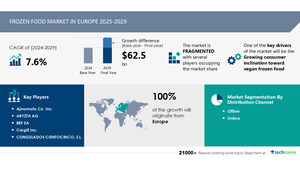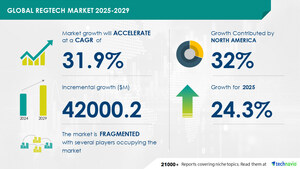NEW YORK, Nov. 26, 2024 /PRNewswire/ -- Report with the AI impact on market trends - The global quantum computing market size is estimated to grow by USD 17.34 billion from 2024-2028, according to Technavio. The market is estimated to grow at a CAGR of 26.37% during the forecast period. Increasing expenditure by stakeholders is driving market growth, with a trend towards growth of ai and machine learning. However, quantum decoherence poses a challenge.Key market players include 1QB Information Technologies Inc., Alibaba Group Holding Ltd., Alphabet Inc., Amazon.com Inc., Anyon Systems Inc., Atos SE, D-Wave Quantum Inc, Honeywell International Inc., ID Quantique SA, Intel Corp., International Business Machines Corp., IonQ Inc., Microsoft Corp., QC Ware, QRA Corp., Quantica Computacao, Quantinuum Ltd., Quantum Circuits Inc., Qubitekk Inc., and Rigetti and Co. LLC.
Key insights into market evolution with AI-powered analysis. Explore trends, segmentation, and growth drivers- View Free Sample PDF
Quantum Computing Market Scope |
|
Report Coverage |
Details |
Base year |
2023 |
Historic period |
2017 - 2021 |
Forecast period |
2024-2028 |
Growth momentum & CAGR |
Accelerate at a CAGR of 26.37% |
Market growth 2024-2028 |
USD 17340.7 million |
Market structure |
Fragmented |
YoY growth 2022-2023 (%) |
20.5 |
Regional analysis |
North America, APAC, Europe, South America, and Middle East and Africa |
Performing market contribution |
North America at 37% |
Key countries |
US, China, Japan, Germany, and India |
Key companies profiled |
1QB Information Technologies Inc., Alibaba Group Holding Ltd., Alphabet Inc., Amazon.com Inc., Anyon Systems Inc., Atos SE, D-Wave Quantum Inc, Honeywell International Inc., ID Quantique SA, Intel Corp., International Business Machines Corp., IonQ Inc., Microsoft Corp., QC Ware, QRA Corp., Quantica Computacao, Quantinuum Ltd., Quantum Circuits Inc., Qubitekk Inc., and Rigetti and Co. LLC |
Market Driver
The quantum computing market is experiencing significant growth as businesses explore the potential of this revolutionary technology. Quantum computing, based on quantum theory and mechanics, promises to solve complex problems faster than classical computers. Key trends include AI, cloud computing, and partnerships with tech giants like AMD. Patent filings indicate a focus on hardware and software development, with applications in various sectors such as biomedical simulations, optimization, and manufacturing. Quantum computing is expected to disrupt industries like electronics, telecommunications, and financial services, with potential use cases in areas like AI drug discovery, energy optimization, and logistics networks. Error mitigation and suppression techniques are crucial for quantum computing hardware, while quantum simulators and networking are driving research and development. Security concerns are being addressed through quantum-accelerated cryptography. The market is expected to grow, with tech media and IDG predicting increased customer spend on quantum computing resources. Quantum computing is poised to bring innovation to information technology, high-performance computing, and consumer technology markets, with potential applications in areas like weather forecasting, traffic optimization, and energy optimization.
Artificial Intelligence (AI) and Machine Learning (ML) are advanced technologies that mimic human intelligence to solve complex problems. AI involves computers, machines, software, and robots thinking intelligently, while ML enables computers to learn from new data. Quantum Computing is set to revolutionize these fields by providing unprecedented processing power. Quantum computers use quantum bits, or qubits, which can exist in multiple states at once, enabling them to process vast amounts of data simultaneously. This makes them ideal for complex AI and ML applications, such as pattern recognition, optimization, and predictive analytics. The integration of quantum computing into AI and ML is expected to lead to significant advancements in fields like healthcare, finance, and research.
Request Sample of our comprehensive report now to stay ahead in the AI-driven market evolution!
Market Challenges
- The quantum computing market is experiencing significant growth as businesses explore the potential of this revolutionary technology. Quantum computing, based on quantum theory and mechanics, offers solutions beyond the capabilities of classical computers. Companies in various sectors, including AI, biomedical simulations, manufacturing, energy, and telecommunications, are investing in quantum computing for product innovation. Quantum computing's potential applications range from optimization and machine learning to electronic material discovery and cryptography. However, challenges persist. Quantum hardware development requires addressing error mitigation and suppression techniques. Quantum computing resources, including quantum computers and quantum computing software, are still in development. Security concerns, particularly around data security, are a major consideration for businesses. Leading tech companies, such as AMD, are partnering to develop quantum-accelerated hybrid algorithms and quantum photonic processors. Terra Quantum, a quantum computing software company, is focusing on AI drug discovery. SaaS business models, cloud-based quantum computing, and data centers are also emerging. Macroeconomic factors, including research and development initiatives, will continue to shape the quantum computing market. The International Data Group and tech media predict a quantum computing market worth billions, with applications in high-performance computing, financial services, and logistics networks. Quantum simulators, quantum networking, and quantum algorithms are also areas of focus. Despite these opportunities, there are also risks. Error correction techniques, processor designs, and quantum information science are critical areas of research. Military affairs and strategic balance are also factors to consider. As the quantum computing market evolves, businesses must make informed technology decisions.
- Quantum computing firms encounter a significant challenge in the form of quantum decoherence. This process refers to the tendency of a quantum state to transition into a classical computing bit due to outside interference. Heat, internal defects, and vibrations are common sources of such interference, leading to the loss of the qubits' stored information to the surroundings. Researchers are dedicated to preserving superposition, the foundation of quantum computing, by delaying decoherence. To achieve a state of coherence, quantum computers require a completely isolated environment to prevent any potential disturbances.
Discover how AI is revolutionizing market trends- Get your access now!
Segment Overview
This quantum computing market report extensively covers market segmentation by
- Deployment
- 1.1 Cloud
- 1.2 On-premise
- End-user
- 2.1 Aerospace and defense
- 2.2 Government
- 2.3 IT and telecom
- 2.4 Others
- Geography
- 3.1 North America
- 3.2 APAC
- 3.3 Europe
- 3.4 South America
- 3.5 Middle East and Africa
1.1 Cloud- Quantum computing on the cloud is a cost-effective solution for firms to access advanced quantum computing systems without the need for significant hardware and software investments. Through a cloud network, users can access these systems on-demand, with broad network access, resource pooling, rapid elasticity, measured service, and self-service capabilities. Major software companies are investing in quantum computing as a service, offering subscription-based access to quantum computing systems. Commercial users, including enterprises and SMEs, are integrating quantum computing into their business activities, particularly in sectors like BFSI, for data analytics and AI capabilities. Quantum computing-as-a-service through the cloud allows for swift setup and implementation, making it an attractive option for businesses looking to adopt quantum computing technology. Technavio predicts that the trend of cloud-based quantum computing adoption will continue, particularly among SMEs, driving market growth during the forecast period.
Download a Sample of our comprehensive report today to discover how AI-driven innovations are reshaping competitive dynamics
Research Analysis
Quantum computing is a revolutionary technology in computer science that utilizes the principles of quantum mechanics to process information. Unlike classical computers that use bits with a value of 0 or 1, quantum computers use qubits, which can exist in multiple states at once, enabling them to solve complex problems much faster. Quantum computing has the potential to revolutionize industries such as finance, healthcare, and materials science. The quantum computing market is expected to grow significantly due to increasing research and development in quantum technology, patent filings, and quantum initiatives from various organizations. Macroeconomic factors, such as government funding and private investment, also play a crucial role in the market's growth. Quantum hardware development is a key focus area, with companies investing in error mitigation and suppression techniques to overcome the challenges of quantum computing. Cloud computing platforms like Xanadu Cloud are providing access to quantum computing resources, enabling researchers and businesses to explore the potential of quantum computing without the need for expensive hardware. Generative AI and artificial intelligence applications are also expected to benefit from quantum computing's ability to process large amounts of data faster. Overall, the quantum computing market is poised for significant growth as the technology continues to advance and find applications in various industries.
Market Research Overview
Quantum computing, a revolutionary technology rooted in quantum theory and mechanics, is poised to disrupt various industries by surpassing the capabilities of classical computers. This emerging field, intertwined with computer science, offers solutions to complex problems in areas such as Artificial Intelligence (AI), optimization, and scientific simulations. Patent filings indicate in quantum hardware and software development. Quantum computing's potential applications span across sectors like Biomedical simulations, Manufacturing, Energy, Telecommunications, and Electronics. Companies are investing heavily in research and development to achieve quantum advantage, with quantum-accelerated AI, generative AI, and hybrid algorithms being key areas of focus. Cloud computing plays a significant role in the quantum computing market, with cloud-based quantum computing and SaaS business models gaining traction. Partnerships between tech giants and startups are driving product innovation, leading to advancements in quantum photonic processors, error mitigation and suppression techniques, and quantum computing hardware. The macroeconomic factors influencing the market include customer spend, technology decisions, and strategic balance in military affairs. The quantum computing landscape is vast, encompassing quantum simulators, quantum networking, quantum algorithms, error correction techniques, portfolio management, and quantum computing resources. Security concerns are a significant challenge, with quantum computing posing threats to traditional encryption methods. The financial services sector is exploring quantum annealing algorithms and quantum computing software for risk analysis and optimization. In summary, the quantum computing market is an evolving ecosystem, driven by scientific innovation, partnerships, and macroeconomic factors. It offers potential solutions to complex problems in various industries, from logistics networks to weather forecasting and energy optimization.
Table of Contents:
1 Executive Summary
2 Market Landscape
3 Market Sizing
4 Historic Market Size
5 Five Forces Analysis
6 Market Segmentation
- Deployment
- Cloud
- On-premise
- End-user
- Aerospace And Defense
- Government
- IT And Telecom
- Others
- Geography
- North America
- APAC
- Europe
- South America
- Middle East And Africa
7 Customer Landscape
8 Geographic Landscape
9 Drivers, Challenges, and Trends
10 Company Landscape
11 Company Analysis
12 Appendix
About Technavio
Technavio is a leading global technology research and advisory company. Their research and analysis focuses on emerging market trends and provides actionable insights to help businesses identify market opportunities and develop effective strategies to optimize their market positions.
With over 500 specialized analysts, Technavio's report library consists of more than 17,000 reports and counting, covering 800 technologies, spanning across 50 countries. Their client base consists of enterprises of all sizes, including more than 100 Fortune 500 companies. This growing client base relies on Technavio's comprehensive coverage, extensive research, and actionable market insights to identify opportunities in existing and potential markets and assess their competitive positions within changing market scenarios.
Contacts
Technavio Research
Jesse Maida
Media & Marketing Executive
US: +1 844 364 1100
UK: +44 203 893 3200
Email: [email protected]
Website: www.technavio.com/
SOURCE Technavio

WANT YOUR COMPANY'S NEWS FEATURED ON PRNEWSWIRE.COM?
Newsrooms &
Influencers
Digital Media
Outlets
Journalists
Opted In





Share this article